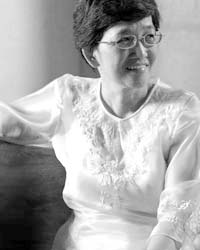First published in Tulay Fortnightly, Chinese-Filipino Digest 29, no. 7 (September 6-19, 2016): 5.
With all the sham and drudgery, it’s still a beautiful world.
This struck me as I attended the Ramon Magsaysay awards, an event I rarely miss. With the many uncertainties and problems in society we face, the speeches of the awardees on Aug. 31 became more inspiring and more meaningful.
Vice President Leni Robredo, the evening’s guest of honor and speaker, closed her speech with the exhortation: “Go out and change the world.” She praised the awardees for daring to change their world, for pursuing their dreams against all odds and in the most adverse conditions. She emphasized that we need ideas and passion and commitment—not guns and gold—to make ideas work and change society.
The occasion was doubly memorable with the knowledge that RM awardee in 1962 for international peace and understanding, Mother Teresa of the Missionaries of Charity, will be canonized on Sept. 4.
Another RM awardee in 2000, Jesse Robredo, whose death was commemorated Aug. 18, was in fact the vice president’s husband.
The evening’s ceremony started with a film clip of soon-to-be Saint Teresa of Calcutta. The iconic image of her wrinkled, weather-beaten face carrying an emaciated boy stuck to my mind throughout the evening. It kindles our hope and faith in the basic goodness of humanity. How I wish President Rodrigo Duterte were present to listen to these people and learn how they value human life, enough to pour their blood, sweat and tears for others.
I’m reminded of the text message I sent to Leni Robredo to convince her to run in the elections last May: “Not everybody is given the privilege to be of service to others, to make a difference in other people’s lives. We, who have been given that chance, should seize it and do our best. It may not come our way again.”
Meaningful and purposeful lives do not happen by accident.
Passing the torch
Last Aug. 28, Kaisa Para Sa Kaunlaran celebrated its 29th anniversary and induction of officers. My daughter, Meah, was elected president of the organization. She will lead the preparations for Kaisa’s 30th anniversary next year.
Meah very reluctantly accepted the position. She has many obligations—her family foremost of all, her teaching job at De La Salle University, managing Bahay Tsinoy Museum, the teacher-training and literacy-training she conducts nationwide, and many local and international conferences where she presents papers. Her job at Kaisa will not be easy, given the limited resources the organization has.
But she is aware that when I started as founding president of Kaisa, we had even less than what Kaisa has now. When I accepted the presidency in 1987, I was scared and felt inadequate, being widowed just a year before.
However, my fellow board members reminded me that in the forest where there’s no lion, the monkey is king. This means, no matter how inadequate I felt, I was then still the most qualified.
It was an honor and a privilege to lead Kaisa 29 years ago, but it entailed a lot of sacrifices. The greatest was Kaisa’s demand on my time at the expense of my two children, Meah was 10 and Sean was two then.
Most of the memories they have of family celebrations and outings or events were those with Kaisa. I am happy they both turned out well despite their mother’s failings.
I recall what I wrote about the many parallels in my own life, in Kaisa, and that of Tita Cory (Corazon Cojuangco Aquino). At the time I wrote “Tita Cory and Me,” Benigno Aquino III was not yet the president.
Now, there is another parallel in our lives. My daughter took up the cudgels of leadership at Kaisa just as Noynoy too chose to take the helm of the government like his mother.
Both the 2016 RM awardees and the founders of Kaisa share something in common: Their commitment and dedication to a cause larger than themselves. The cause of the Tsinoy community in mainstream society was the glue that held Kaisa founders together.
As the torch is passed to the next generation, we are confident that Kaisa has succeeded in its primary objective of hastening integration. It is time to move forward, address national issues and expand development projects as the organization faces the greater challenges of nation building.
